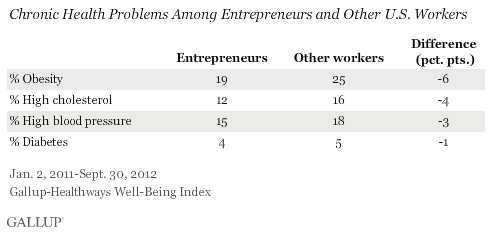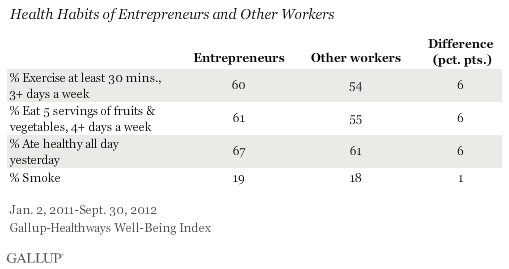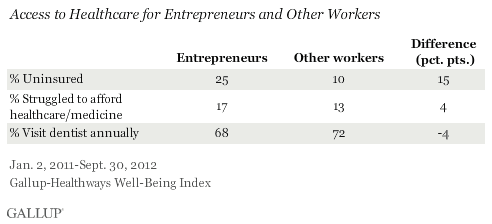WASHINGTON, D.C. -- Better health appears to be one of the perks of being an entrepreneur in America. In the U.S., entrepreneurs are less likely than other workers to report having ever been diagnosed with chronic health problems such as high cholesterol, high blood pressure, and diabetes. And they are much less likely to be obese -- 19% vs. 25% -- than other workers.

Importantly, the differences between entrepreneurs and other U.S. workers in obesity and in chronic disease rates hold true even after controlling for age, gender, race/ethnicity, region, income, education, marital status, and weekly hours worked. This means that these demographic factors alone don't account for entrepreneurs' physical health dividend; rather, there is something else about being an entrepreneur that relates to having better health.
These findings are based on more than 273,175 interviews conducted Jan. 2, 2011-Sept. 30, 2012, with American adults as a part of the Gallup-Healthways Well-Being Index. Gallup classified 6,896 of these respondents as entrepreneurs if they self-identified themselves as both "self-employed" and as a "business owner."
Entrepreneurs' Health Habits May Contribute to Lower Chronic Disease Rates
Entrepreneurs report better health habits than other workers, which may be responsible, in part, for the lower chronic disease rates for this group. Entrepreneurs are more likely than other employed adults to say they exercise frequently (60% vs. 54%) or eat fruits and vegetables regularly (61% vs. 55%) and are more likely to say they ate healthy all day "yesterday" (67% vs. 61%). However, smoking rates were about equal among entrepreneurs and other U.S. workers.

Entrepreneurs Much Less Likely to Have Healthcare Necessities
Entrepreneurs seem to be maintaining better health despite lacking basic healthcare necessities. One in four entrepreneurs lack health insurance, contrasting with the one in 10 other workers who are uninsured -- a difference of 15 percentage points. The reason for that difference is not clear, but it could either reflect the high cost of health insurance for individuals and small business owners, or a greater willingness on the part of entrepreneurs to accept the risks inherent in not having health insurance.
In accordance with the higher rate of entrepreneurs who are uninsured, they are more likely than other employed adults to say there have been times in the past 12 months when they did not have enough money to pay for the healthcare or medicine that they or their families needed. Entrepreneurs are also significantly less likely than other workers to say they have visited a dentist in the past year.

Bottom Line
Entrepreneurs are less likely than other employed adults to report having chronic health problems and more likely to report better health behaviors. One possible explanation for these differences may be that the discipline and energy needed for entrepreneurs to start and run their own businesses may also drive them to exercise and eat fruits and vegetables regularly. Alternatively, self-employed adults have the ability to set their own schedules and, thus, may have more flexibility to exercise and plan healthy meals than those who work for an employer.
While entrepreneurs have lower chronic disease rates, they may be more likely to have negative health outcomes from these illnesses because they often lack access to the healthcare and medicine needed to treat them. It is possible that when the main components of the Affordable Care Act -- including the individual mandate and insurance exchanges -- go into effect in 2014, entrepreneurs may become more likely to be able to afford preventative healthcare and medicine. But, until then, this key group -- those who create jobs, launch new products, and innovate -- may be precariously positioned to deal with certain health problems if and when they occur.
To find out how leaders can best support the health and well-being of entrepreneurs, read "Attracting Entrepreneurs to Your City" in the Gallup Business Journal.
About the Gallup-Healthways Well-Being Index
The Gallup-Healthways Well-Being Index tracks well-being in the U.S., U.K., and Germany and provides best-in-class solutions for a healthier world. To learn more, please visit well-beingindex.com.
Survey Methods
Results are based on telephone interviews conducted as part of the Gallup Healthways Well-Being Index survey Jan. 2, 2011-Sept. 30, 2012, with a random sample of more than 273,175 adults, aged 18 and older, living in all 50 U.S. states and the District of Columbia. Of these, 6,896 were defined as entrepreneurs.
For results based on the total sample of entrepreneurs, one can say with 95% confidence that the maximum margin of sampling error is ±1.4 percentage points.
For results based on the total sample of employed non-entrepreneurs, one can say with 95% confidence that the maximum margin of sampling error is ±0.2 percentage points.
Interviews are conducted with respondents on landline telephones and cellular phones, with interviews conducted in Spanish for respondents who are primarily Spanish-speaking. Each sample includes a minimum quota of 400 cellphone respondents and 600 landline respondents per 1,000 national adults, with additional minimum quotas among landline respondents by region. Landline telephone numbers are chosen at random among listed telephone numbers. Cellphone numbers are selected using random digit dial methods. Landline respondents are chosen at random within each household on the basis of which member had the most recent birthday.
Samples are weighted by gender, age, race, Hispanic ethnicity, education, region, adults in the household, and phone status (cellphone-only/landline only/both, cellphone mostly, and having an unlisted landline number). Demographic weighting targets are based on the March 2011 Current Population Survey figures for the aged 18 and older non-institutionalized population living in U.S. telephone households. All reported margins of sampling error include the computed design effects for weighting and sample design.
In addition to sampling error, question wording and practical difficulties in conducting surveys can introduce error or bias into the findings of public opinion polls.
For more details on Gallup's polling methodology, visit https://www.gallup.com/.